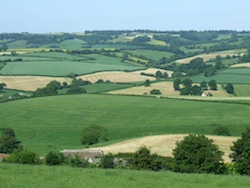
Farming in this country is steeped in tradition and for many the family farm is passed down from generation to generation. But, in recent years farming has attracted new investors, whether they be public investors, "lifestyle" farmers looking for the "good life", or new entrants wanting to enter the industry.
Farmland values across Great Britain rose in 2012 for all land types. Despite very difficult weather conditions, with a disappointing harvest, and high costs for fuel, sprays and feed, there continues to be a solid demand for agricultural land in this country.
According to property agents Knight Frank, English farmland values have soared by 207 per cent in the past ten years to an average of £6,307 per acre. Arable land in the south west increased in value by 11 per cent in 2012 according to Chesterton Humberts.
Future prospects remain optimistic according to the leading land agents, with many agricultural valuers predicting growth in the short to medium term. Ian Bailey, Head of Rural Research at Savills has confirmed that their forecast for growth is 40 per cent over the next five years for average farmland values across Great Britain. The market is regarded as a safe haven for cash.
Yet why does this continue to be the case when the latest Total Income From Farming data produced by DEFRA showed UK farm profits falling by 14 per cent between 2011 and 2012?
There still seems to be a general optimism in the industry, with improvements and returns predicted by some, particularly in the dairy, pig, sheep and fruit sectors. The ongoing subsidy support for farmers under the CAP reforms seems to play a part in the decision to invest. A rising food demand and a growing population continues to fuel the market.
Leading agents have been quick to point out that there are wide variations in predicted valuations of farmland, depending on the sector.
According to Savills, growth has concentrated along the eastern side of England, including the north east fuelled by a demand for arable land, where yield per acre is generally higher.
Farmland has done well when compared with other investments, such as stocks, shares, and residential property. Ian Bailey of Savills research has stated that the UK investment performance of farmland and forestry has outperformed all other assets over the past ten years. But the extent of price growth has slowed in recent years to 4 per cent in the year to March 2013 and the recent jump in equity values has resulted in the FTSE 100 performing more strongly in the last year.
About the author

Nicola Horrocks is an Associate with Michelmores LLP.
 9 Jan 2017
9 Jan 2017 8 Dec 2016
8 Dec 2016 29 Apr 2015
29 Apr 2015 12 Mar 2015
12 Mar 2015 12 Mar 2015
12 Mar 2015Have you any commercial property events you'd like to tell us about? It could be networking, exhibitions, seminars, industry lunches or sporting fixtures. We will list them for free. Just email newsdesk@propnews.co.uk with the following details: Event name, date, time, venue, cost, booking info and a brief description of the event.
To list your property job vacancies on Property News. Email: richenda@propnews.co.uk.